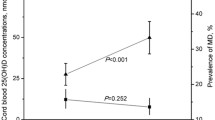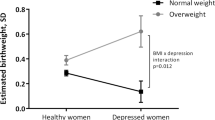Abstract
This study aimed to explore the association of maternal depression with nutrient intake, growth, and development of preterm infants. A cohort study of 201 infants was conducted in Beijing. Based on the gestational age of an infant and status of the mother, the infants were divided into four groups: non-depression-fullterm (64), non-depression-preterm (70), depression-fullterm (36), and depression-preterm (31). Data on sociodemographic characteristics, nutritional intake, growth, and developmental status of children at 8 months (corrected ages) were collected using a quantitative questionnaire, a 24-Hour Dietary Recall, anthropometric measurements, and the Bayley-III scale. A multivariate analysis was used to evaluate the effects of maternal depression and preterm birth on infant growth and development. The energy, protein, and carbohydrate intake in the depression group was lower than the recommended amounts. The depression preterm groups indicated the lowest Z-scores for length and weight and the lowest Bayley-III scores. Preterm infants of depressed mothers are at high risks of poor growth and development delay.
Similar content being viewed by others
References
Weobong B, Ten Asbroek AH, Soremekun S, Danso S, Owusu-Agyei S, Prince M, Kirkwood BR. Determinants of postnatal depression in rural Ghana: findings from the don population based cohort study. Depress Anxiety 2015; 32(2): 108–119
O’Hara MW, McCabe JE. Postpartum depression: current status and future directions. Annu Rev Clin Psychol 2013; 9(2): 379–407
Qian Y, Yan X. Prevalence of postpartum depression in China: a systematic analysis. Chin J Prac Nurs (Zhongguo Shi Yong Hu Li Za Zhi) 2013; 29(12):1–3 (in Chinese)
Rahman A, Iqbal Z, Bunn J, Lovel H, Harrington R. Impact of maternal depression on infant nutritional status and illness: a cohort study. Arch Gen Psychiatry 2004; 61(9): 946–952
Hipwell AE, Goossens FA, Melhuish EC, Kumar R. Severe maternal psychopathology and infant-mother attachment. Dev Psychopathol 2000; 12(2): 157–175
Lewinsohn PM, Olino TM, Klein DN. Psychosocial impairment in offspring of depressed parents. Psychol Med 2005; 35(10): 1493–1503
El-Behadli AF, Sharp C, Hughes SO, Obasi EM, Nicklas TA. Maternal depression, stress and feeding styles: towards a framework for theory and research in child obesity. Br J Nutr 2015; 113 Suppl: S55–71
Singer LT, Fulton S, Davillier M, Koshy D, Salvator A, Baley JE. Effects of infant risk status and maternal psychological distress on maternal-infant interactions during the first year of life. J Dev Behav Pediatr 2003; 24(4): 233–241
Rahman A, Harrington R, Bunn J. Can maternal depression increase infant risk of illness and growth impairment in developing countries? Child Care Health Dev 2002; 28(1): 51–56
World Health Organization. Almost one million children die each year due to complications of preterm birth. Many survivors may face a lifetime of disability, including learning disabilities and visual and hearing problems. 2014
Wendell-Smith C. Estimation of fetal weight by ultrasound. Aust N Z J Obstet Gynaecol 2000; 40(3): 361–362
Ehrenkranz RA, Dusick AM, Vohr BR, Wright LL, Wrage LA, Poole WK. Growth in the neonatal intensive care unit influences neurodevelopmental and growth outcomes of extremely low birth weight infants. Pediatrics 2006; 117(4): 1253–1261
O’Connor DL, Khan S, Weishuhn K, Vaughan J, Jefferies A, Campbell DM, Asztalos E, Feldman M, Rovet J, Westall C, Whyte H; Postdischarge Feeding Study Group. Growth and nutrient intakes of human milk-fed preterm infants provided with extra energy and nutrients after hospital discharge. Pediatrics 2008; 121(4): 766–776
Cooke RJ. Catch-up growth: implications for the preterm and term infant. Eur J Clin Nutr 2010; 64 Suppl1:S8–S10
Morgan C, Herwitker S, Badhawi I, Hart A, Tan M, Mayes K, Newland P, Turner MA. SCAMP: standardised, concentrated, additional macronutrients, parenteral nutrition in very preterm infants: a phase IV randomised, controlled exploratory study of macronutrient intake, growth and other aspects of neonatal care. BMC Pediatr 2011; 11(7): 53
Lee SH, Nurmatov UB, Nwaru BI, Mukherjee M, Grant L, Pagliari C. Effectiveness of mHealth interventions for maternal, newborn and child health in low- and middle-income countries: systematic review and meta-analysis. J Glob Health 2016; 6(1): 010401
Sroufe LA. Emotional Development: The Organization of Emotional Life in the Early Years (Cambridge Studies in Social and Educational Development). New York: Cambridge University Press, 1996
Lee DT, Yip SK, Chiu HF, Leung TY, Chan KP, Chau IO, Leung HC, Chung TK. Detecting postnatal depression in Chinese women. Validation of the Chinese version of the Edinburgh Postnatal Depression Scale. Br J Psychiatry 1998; 172(5): 433–437
Cox JL, Holden JM, Sagovsky R. Detection of postnatal depression. Development of the 10-item Edinburgh Postnatal Depression Scale. Br J Psychiatry 1987; 150(6): 782–786
Spitzer RL, Endicott J, Robins E. Research diagnostic criteria: rationale and reliability. Arch Gen Psychiatry 1978; 35(6): 773–782
Yuexin Y, Guangya W, Xingchang P. China Food Composition 2004. Beijing: Peking University Medical Press, 2004
Kathleen V, Jamie Z, Ron D, Willis JO. Bayley Scales of Infant and Toddler Development. Third Edition. JohnWiley & Sons, Inc., 2014
Anoop S, Saravanan B, Joseph A, Cherian A, Jacob KS. Maternal depression and low maternal intelligence as risk factors for malnutrition in children: a community based case-control study from South India. Arch Dis Child 2004; 89(4): 325–329
Pridham K, Brown R, Clark R, Limbo RK, Schroeder M, Henriques J, Bohne E. Effect of guided participation on feeding competencies of mothers and their premature infants. Res Nurs Health 2005; 28 (3): 252–267
Goulding AN, Rosenblum KL, Miller AL, Peterson KE, Chen YP, Kaciroti N, Lumeng JC. Associations between maternal depressive symptoms and child feeding practices in a cross-sectional study of low-income mothers and their young children. Int J Behav Nutr Phys Act 2014; 11(1): 75
Singer LT, Davillier M, Preuss L, Szekely L, Hawkins S, Yamashita T, Baley J. Feeding interactions in infants with very low birth weight and bronchopulmonary dysplasia. J Dev Behav Pediatr 1996; 17(2): 69–76
Pridham K, Lin CY, Brown R. Mothers’ evaluation of their caregiving for premature and full-term infants through the first year: contributing factors. Res Nurs Health 2001; 24(3): 157–169
Embleton ND. Optimal protein and energy intakes in preterm infants. Early Hum Dev 2007; 83(12): 831–837
Agostini F, Neri E, Dellabartola S, Biasini A, Monti F. Early interactive behaviours in preterm infants and their mothers: influences of maternal depressive symptomatology and neonatal birth weight. Infant Behav Dev 2014; 37(1): 86–93
Premji SS. Ontogeny of the gastrointestinal system and its impact on feeding the preterm infant. Neonatal Netw 1998; 17(2): 17–24
Mallan KM, Daniels LA, Wilson JL, Jansen E, Nicholson JM. Association between maternal depressive symptoms in the early post-natal period and responsiveness in feeding at child age 2 years. Matern Child Nutr 2015; 11(4): 926–935
Feldman R, Weller A, Leckman JF, Kuint J, Eidelman AI. The nature of the mother’s tie to her infant: maternal bonding under conditions of proximity, separation, and potential loss. J Child Psychol Psychiatry 1999; 40(6): 929–939
Aktar E, Mandell DJ, de Vente W, Majdandžić M, Raijmakers MEJ, Bögels SM. Infants’ temperament and mothers’, and fathers’ depression predict infants’ attention to objects paired with emotional faces. J Abnorm Child Psychol 2016; 44(5): 975–990
Perra O, Phillips R, Fyfield R, Waters C, Hay DF. Does mothers’ postnatal depression influence the development of imitation? J Child Psychol Psychiatry 2015; 56(11): 1231–1238
Weissman MM, Wickramaratne P, Gameroff MJ, Warner V, Pilowsky D, Kohad RG, Verdeli H, Skipper J, Talati A. Offspring of depressed parents: 30 years later. Am J Psychiatry 2016; 173(10): 1024–1032
Silventoinen K, Pitkäniemi J, Latvala A, Kaprio J, Yokoyama Y. Association between physical and motor development in childhood: a longitudinal study of Japanese twins. Twin Res Hum Genet 2014; 17(3): 192–198
Simopoulos AP. Dietary omega-3 fatty acid deficiency and high fructose intake in the development of metabolic syndrome, brain metabolic abnormalities, and non-alcoholic fatty liver disease. Nutrients 2013; 5(8): 2901–2923
Guellec I, Lapillonne A, Marret S, Picaud JC, Mitanchez D, Charkaluk ML, Fresson J, Arnaud C, Flamand C, Cambonie G, Kaminski M, Roze JC, Ancel PY. Effect of intra- and extrauterine growth on long-term neurologic outcomes of very preterm infants. J Pediatr 2016; 175:93–9 e1
Latal-Hajnal B, von Siebenthal K, Kovari H, Bucher HU, Largo RH. Postnatal growth in VLBW infants: significant association with neurodevelopmental outcome. J Pediatr 2003; 143(2): 163–170
Piek JP, Dawson L, Smith LM, Gasson N. The role of early fine and gross motor development on later motor and cognitive ability. Hum Mov Sci 2008; 27(5): 668–681
Pina-Camacho L, Jensen SK, Gaysina D, Barker ED. Maternal depression symptoms, unhealthy diet and child emotional-behavioural dysregulation. Psychol Med 2015; 45(9): 1851–1860
Ehrenkranz RA, Younes N, Lemons JA, Fanaroff AA, Donovan EF, Wright LL, Katsikiotis V, Tyson JE, Oh W, Shankaran S, Bauer CR, Korones SB, Stoll BJ, Stevenson DK, Papile LA. Longitudinal growth of hospitalized very low birth weight infants. Pediatrics 1999; 104(2 2 Pt 1): 280–289
Teissèdre F, Chabrol H. Detecting women at risk for postnatal depression using the Edinburgh Postnatal Depression Scale at 2 to 3 days postpartum. Can J Psychiatry 2004; 49(1): 51–54
Hiltunen P, Raudaskoski T, Ebeling H, Moilanen I. Does pain relief during delivery decrease the risk of postnatal depression? Acta Obstet Gynecol Scand 2004; 83(3): 257–261
Patel RR, Murphy DJ, Peters TJ. Operative delivery and postnatal depression: a cohort study. BMJ 2005; 330(7496): 879–881
de Tychey C, Briançon S, Lighezzolo J, Spitz E, Kabuth B, de Luigi V, Messembourg C, Girvan F, Rosati A, Thockler A, Vincent S. Quality of life, postnatal depression and baby gender. J Clin Nurs 2008; 17(3): 312–322
Pan XF, Zhi-Ming LU, Xiao J. Prospective study on occurrence of postnatal depression and its psychosocial risk factors. Matern Child Health Care China (Zhongguo Fu You Bao Jian) 2004;19(9):28–30 (in Chinese)
Acknowledgements
This study was supported by the National Natural Science Foundation of China (No. 81202216) and the Beijing Higher Education Young Elite Teacher Project (No. YETP0059), China. We want to thank research teams from Peking University Third Hospital and Haidian Maternal & Child Health Hospital in Beijing for their hard work in orchestrating the field work and identifying study population. We also want to thank the family members who participated in this study and those who were excluded from the study.We are grateful for endeavors from each member in our study, including Hong Zhou, YanWang, Yao Feng, Yan Zhang, Ping Duan, Fang Ye, Wenxing Bai, Peng Li, Anqi Wang, Xi Wang, Shusheng Luo, Zhenghong Ren, and Chuyun Kang (Division of Maternal and Child Health, School of Public Health, Peking University), as well as Jing Sun (Menzies Health Institute Queensland and School of Medicine, Griffith University, Australia), Yongmei Chen, Qi Yan, Zhi Li (Haidian Maternal & Child Health Hospital in Beijing), Shan Lu, and Yuan Wei (Peking University Third Hospital).
Author information
Authors and Affiliations
Corresponding authors
Rights and permissions
About this article
Cite this article
Wang, H., Zhou, H., Zhang, Y. et al. Association of maternal depression with dietary intake, growth, and development of preterm infants: a cohort study in Beijing, China. Front. Med. 12, 533–541 (2018). https://doi.org/10.1007/s11684-017-0591-y
Received:
Accepted:
Published:
Issue Date:
DOI: https://doi.org/10.1007/s11684-017-0591-y




